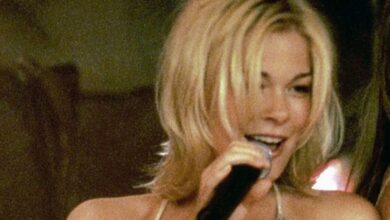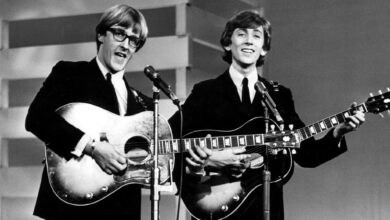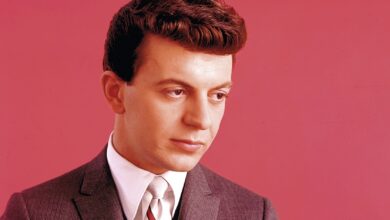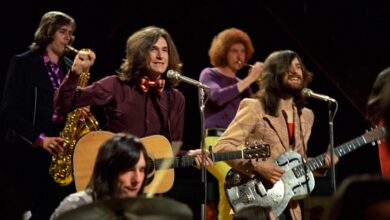George Strait & Alan Jackson’s “Murder on Music Row” Ignites a Country Music Reckoning in 2000
In 2000, George Strait and Alan Jackson—two titans of traditional country—joined forces on a song that would both honor their genre’s roots and stir up passionate debate across Nashville. “Murder on Music Row,” originally penned and recorded by Larry Cordle and Larry Shell in 1999, was never released as a single, yet its impact reverberated throughout the industry. Strait and Jackson’s duet brought the track national attention, and without charting formally, it became one of the most talked-about performances of the year. A musical protest as much as a country ballad, it called out the dilution of traditional country by pop influences and ignited a cultural conversation that had long been simmering.
George Strait, often referred to as the “King of Country,” had spent two decades embodying the neotraditionalist movement. With a smooth Texas drawl and a preference for steel guitars over synthesizers, Strait’s steady presence anchored the genre through changing musical tides. Alan Jackson, too, was a fierce defender of country’s core. Emerging in the late 1980s, he balanced commercial success with a firm commitment to storytelling, twang, and timeless themes. When the two artists performed “Murder on Music Row” at the 2000 Country Music Association Awards, it felt less like a duet and more like a line in the sand.
The song itself was born out of frustration. Songwriters Larry Cordle and Larry Shell lamented the increasing prevalence of pop production in Nashville. “Murder on Music Row” metaphorically accuses the music industry of killing traditional country, with lines like “They said no one would buy them old drinking and cheating songs.” It wasn’t just about nostalgia—it was about identity. For many, the track gave voice to an unspoken anxiety that the genre was losing its soul.
The Strait-Jackson rendition retained the simplicity of the original but gave it new life with the weight of two icons behind it. Recorded live and featured on George Strait’s compilation Latest Greatest Straitest Hits, the version was produced with restraint. There were no overproduced flourishes—just twangy guitars, steady drums, and two of country’s most beloved voices in perfect harmony. Their vocal blend, relaxed but resolute, underscored the song’s pointed message.
Despite not being released to radio, “Murder on Music Row” won the Vocal Event of the Year at the 2001 CMA Awards and became a fan-favorite almost overnight. The duet wasn’t pushed by labels or top 40 rotations, but it didn’t need to be. The audience’s response was organic and fervent. Fans and purists hailed it as an anthem for traditional country values. Meanwhile, critics and industry insiders debated whether the song was reactionary or a legitimate critique of modern trends.
The song’s cultural shockwave was immediate. It reopened conversations about what “country” meant in the 21st century. Was country music evolving or selling out? Had the genre grown too inclusive, or had it forgotten its roots? In the years that followed, “Murder on Music Row” was referenced in op-eds, fan forums, and even label meetings. It created an awareness that helped shape the branding and sound of many artists trying to strike a balance between commercial appeal and genre authenticity.
For George Strait, the song was a reaffirmation of his leadership role in country music’s traditionalist camp. It reinforced his image as a guardian of the genre, someone who didn’t chase trends but stayed true to his roots. For Alan Jackson, already known for hits like “Chattahoochee” and “Gone Country,” the song sharpened his image as a truth-teller—a man willing to say what many wouldn’t, even if it ruffled feathers.
Beyond their own careers, the duet influenced a new generation of artists who felt empowered to embrace tradition over trends. Acts like Chris Stapleton, Jamey Johnson, and Cody Johnson have since cited a desire to preserve classic country values in their work. In many ways, “Murder on Music Row” planted seeds for the Americana revival and the rise of “outlaw-lite” artists who now balance mainstream success with traditional roots.
The song has also seen its share of covers, tributes, and live renditions. While none have matched the resonance of Strait and Jackson’s performance, many up-and-coming country artists continue to include it in their sets as a nod to their stylistic allegiance. It remains a barometer of authenticity in a genre constantly negotiating its identity.
Its release coincided with a broader industry shift. The early 2000s saw a divide widening between the country-pop crossover crowd—artists like Shania Twain and Faith Hill—and those who clung tightly to honky-tonk storytelling. “Murder on Music Row” captured that tension perfectly, and its timing couldn’t have been more potent. It became a cultural document, frozen in the moment yet timeless in its message.
Even now, the song enjoys a long afterlife. It’s often cited in debates about modern country’s direction and frequently resurfaces in retrospectives about the genre’s evolution. Radio DJs, despite it not being a chart hit, still spin it during themed blocks or as part of “real country” throwbacks. It’s a reminder that impact isn’t always measured in Billboard numbers.
Musically, the track didn’t innovate in production—but it innovated in attitude. Its open challenge to the industry sparked a wave of introspection. It reminded producers, songwriters, and artists that tradition has power and that simplicity, when wielded with conviction, can shake an entire format.
Although neither George Strait nor Alan Jackson needed the song to bolster their legacies, “Murder on Music Row” added an important chapter to both their stories. It showed courage in conviction and loyalty to genre principles at a time when others were chasing crossover dreams. Their duet became more than music—it became a mission statement.
In the grand narrative of country music, “Murder on Music Row” stands as a symbolic turning point. It encapsulates the eternal struggle between tradition and progress, art and commerce. And thanks to the unwavering voices of Strait and Jackson, it remains one of the most powerful protest songs Nashville has ever heard.



